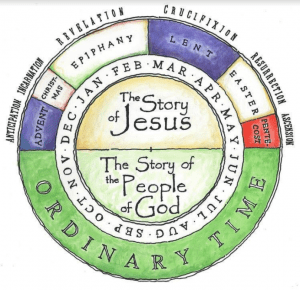Michael Jensen, at The Gospel Coalition, briefly sketched nine things he wants people to know about the Anglican Church. I have clipped only his bold-faced points and you can read his short explanations at the link above but then I want to add one more point, something he did not mention that puts it all into a slightly different — broader — context and one I’m sure he’d affirm:
1. Since the arrival of Christianity in Britain in the 3rd century, British Christianity has had a distinct flavor and independence of spirit, and was frequently in tension with Roman Catholicism.
2. The break with Rome in the 16th century had political causes, but also saw the emergence of an evangelical theology.
3. Anglicanism is Reformed.
4. Scripture is the supreme authority in Anglicanism.
5. Justification by faith alone is at the heart of Anglican soteriology.
6. In Anglican thought, the sacraments are “effectual signs” received by faith.
7. The Anglican liturgy—best encapsulated in the 1662 Book of Common Prayer—is designed to soak the congregation in the Scriptures, and to remind them of the priority of grace in the Christian life.
8. Anglicanism is a missionary faith, and has sponsored global missions since the 18th century.
9. Global Anglicanism is more African and Asian than it is English and American.
This listing by Jensen seeks to assure folks that Anglicanism is kosher for conservative evangelicals, which it can be and should be (and sometimes quite frankly isn’t) and is not restricted to them, but I’d like to go behind these to what is even more primary:
Anglicanism affirms the historic Christian creedal faith. It is catholic in this sense.
So I ask, Where’s Jesus as a Person in this sketch? Where’s God the Father as a Person? Where’s the Holy Spirit as a Person? Father, Son, Spirit… That is, the first element of Anglicanism is that we affirm the creed and the historic faith of the church and that faith is belief in God — Father, Son and Spirit — and the church God has created.
We confess every week in fellowship with one another…
Not (by the way) We/I believe in the Anglican Church and its history and its special ideas and the Reformation and the doctrines of grace (except, let it be known, in the particular configuration of the following and its various articulations in Thirty Nine Articles [as the grounding]):
But We/I believe in one God the Father … one Lord Jesus Christ… in the Holy Ghost … and only then do we confess our faith in the church, but it is expansive: one, holy, catholic and apostolic church. The Anglican Church flows out of the creed about the church and must be understood from that basis.
The first thing to know about Anglicanism is that We believe in the glory of knowing God personally in the face of Jesus Christ through the Holy Spirit who has created the church.
Here, too, is the order of the first few articles in the 39 Articles:
I. Of Faith in the Holy Trinity.
There is but one living and true God, everlasting, without body, parts, or passions; of infinite power, wisdom, and goodness; the Maker, and Preserver of all things both visible and invisible. And in unity of this Godhead there be three Persons, of one substance, power, and eternity; the Father, the Son, and the Holy Ghost.
II. Of the Word or Son of God, which was made very Man.
The Son, which is the Word of the Father, begotten from everlasting of the Father, the very and eternal God, and of one substance with the Father, took Man’s nature in the womb of the blessed Virgin, of her substance: so that two whole and perfect Natures, that is to say, the Godhead and Manhood, were joined together in one Person, never to be divided, whereof is one Christ, very God, and very Man; who truly suffered, was crucified, dead, and buried, to reconcile his Father to us, and to be a sacrifice, not only for original guilt, but also for actual sins of men
III. Of the going down of Christ into Hell.
As Christ died for us, and was buried, so also is it to be believed, that he went down into Hell.
IV. Of the Resurrection of Christ.
Christ did truly rise again from death, and took again his body, with flesh, bones, and all things appertaining to the perfection of Man’s nature; wherewith he ascended into Heaven, and there sitteth, until he return to judge all Men at the last day.
V. Of the Holy Ghost.
The Holy Ghost, proceeding from the Father and the Son, is of one substance, majesty, and glory, with the Father and the Son, very and eternal God.
VI. Of the Sufficiency of the Holy Scriptures for Salvation.
Holy Scripture containeth all things necessary to salvation: so that whatsoever is not read therein, nor may be proved thereby, is not to be required of any man, that it should be believed as an article of the Faith, or be thought requisite or necessary to salvation. In the name of the Holy Scripture we do understand those canonical Books of the Old and New Testament, of whose authority was never any doubt in the Church.











